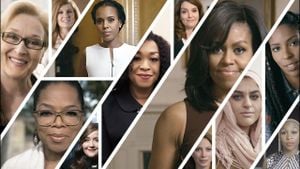The debate over private school vouchers is heating up across the United States, with significant ramifications for public education systems. This contentious issue has particularly gained traction as recent Republican debates highlighted diverse opinions on school choice, creating sharp divides among candidates and voters alike.
During the second Republican debate of the 2024 presidential primaries, education emerged as one of the pivotal topics. Candidates, including Nikki Haley and Tim Scott, exchanged barbs over their respective records concerning spending and educational outcomes, spotlighting the growing influence of educational policies on their campaigns.
Supporters of universal school vouchers argue they provide parents with more choices and greater control over their children's education. This year alone, seven Republican-led states, including Florida, adopted laws promoting such vouchers, which can now be accessed by virtually all students without income restrictions.
Critics, predominantly from public school sectors, claim these vouchers operate as mechanisms to siphon funds from public schools, effectively undermining their budgets. The system reallocates tax dollars from public schooling directly to parents, allowing them to cover educational expenses at private and religious institutions.
Polling data reveals nuanced public sentiment surrounding school vouchers. A recent study found 46 percent of Republicans tentatively supported these vouchers; interest surged to 70 percent when respondents were provided with definitions and explanations.
Despite this growing support among GOP voters, the public remains divided on how these policies impact educational equality and choice. Many fear the development of 'ed tech' monopolies as private institutions stand poised to benefit from shifting public dollars, which could potentially degrade public education quality.
Ohio is one battleground state where the voucher debate is at the forefront, with activists and public school districts rallying against the private school voucher program. An Ohio Senate leader attempted to avoid questioning under subpoena related to the legality and repercussions of such programs.
Senate President Matt Huffman found himself at the center of legal battles as opponents sought to compel him to testify about his knowledge of state education funding and his role in establishing the controversial EdChoice program. While Huffman initially resisted, proponents of public school funding view his testimony as potentially pivotal to their case.
Following recent developments, those pushing back against the voucher program assessed their case as fundamentally strong, believing they could effectively argue vouchers violate the constitutional requirement for the state to maintain efficient public schools. The legal ball is now rolling toward trial, set for November, signaling the urgency within the educational reform debate.
This clash of viewpoints also extends to social media, where educators and school districts are actively engaging with communities on the ramifications of voucher politics. Recent posts from various school districts across Kentucky have sparked widespread debate as local leaders weigh the impending vote on Amendment 2, which could alter public school funding methods significantly.
Supporters of school choice argue such amendments could empower families, particularly those from lower-income backgrounds, to select educational environments best suited for their children. Advocates assert this will lead to enhanced competition among schools and thereby improve overall educational standards.
On the flip side, opponents warn of the ill effects of funding diversion, conceptualizing school vouchers as harmful to public schools already struggling to meet educational demands. Many express concern about how public education systems could sustain quality learning environments when funding is dwindling.
With the next electoral season looming, candidates vying for positions at federal and local levels are leaning heavily on educational policy as they look to engage voters. This becomes increasingly evident as school choice remains aggressively debated on both social media platforms and local town halls.
The sentiment around these reforms is shifting, particularly among younger voters who are increasingly prioritizing education reform. Millennials and Gen Z individuals show heightened concern about educational affordability and potential inequities, reshaping how politicians view the viability of voucher systems.
Just as the debate intensifies, so does the awareness of financial constraints impacting families across America. Many parents express feeling trapped by the high cost of private education and inadequate public school options, adding layers of urgency to the discussion.
Further complicifying matters, various states, including Kentucky and Ohio, are engaged in litigation over voucher programs, with legal precedents potentially influencing future policies nationwide. At the heart of these disputes lies the struggle to determine the balance between private sector participation and public funding aimed at fostering equitable educational opportunities.
Conducting ample research, and seeking out community perspectives will play pivotal roles for educators, policymakers, and advocates as this debate evolves. Strengthening community engagement and ensuring open avenues of communication could provide insights facilitating compromises, helping adjust school funding methodologies responsive to local needs.
The state of U.S. education hangs precariously between different ideologies concerning how best to allocate funds and resources effectively. A united sensation among parents and students will likely pressure legislators to remain agile and responsive to the pressing needs of their constituents.
Whether the prospect of universal school vouchers rejuvenates the educational system or exacerbates existing inequalities is yet to be determined. Outcomes from upcoming legal verdicts and accompanying electoral decisions could significantly influence which direction the educational policy sails toward.
Education remains at the forefront, commanding attention as legislators refine their messages on school choice and its inherent challenges. With every debate, the narrative around private school vouchers evolves, reflecting public sentiment's currents and the promises of educational equity.



